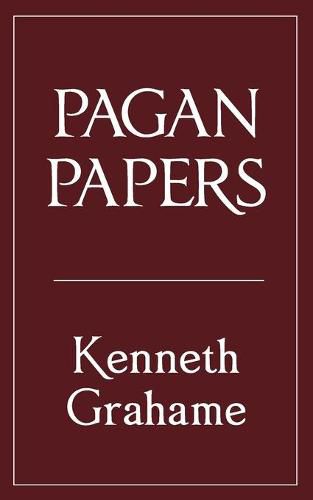Readings Newsletter
Become a Readings Member to make your shopping experience even easier.
Sign in or sign up for free!
You’re not far away from qualifying for FREE standard shipping within Australia
You’ve qualified for FREE standard shipping within Australia
The cart is loading…






This title is printed to order. This book may have been self-published. If so, we cannot guarantee the quality of the content. In the main most books will have gone through the editing process however some may not. We therefore suggest that you be aware of this before ordering this book. If in doubt check either the author or publisher’s details as we are unable to accept any returns unless they are faulty. Please contact us if you have any questions.
Before the publication of The Wind in the Willows, Kenneth Grahame’s reputation was quite different. He was known both as a writer of delicately observed essays on childhood, and as an exquisite stylist, whose essays on adult subjects were pithy and distinctive exercises in wit. Pagan Papers was the collection with which he established his name in 1893.
In The Romance of the Rail he is torn between the joy of a train’s night-whistle - the dreams of discovery it heralds, and the realisation of the ‘crowning wrong that is wrought us of furnace and piston-rod’; in Loafing he muses over pleasures of mind and their indolent harmony, contrasting them with the ‘corporeal pangs’ of the thirst for activity; in The Rural Pan he bemoans the advent of dull and good suburban behaviour, relishing that there are still hidden country places where the cheery simple sinner still survives; in Of Smoking he offers a paean to the more refined (non-cigarette) delectations of tobacco; in The White Poppy he guardedly discusses opium’s healing ‘magic juice of oblivion’; and in Justifiable Homicide he gleefully considers the merits of bumping off irritating relatives!
In these, and twelve other brilliant excursions here, where he leads us through the lures and dangers of books, the open road, the countryside, and all the varieties of sensual pleasure, Grahame’s consummate style and elegant language mark him out as a master.
$9.00 standard shipping within Australia
FREE standard shipping within Australia for orders over $100.00
Express & International shipping calculated at checkout
This title is printed to order. This book may have been self-published. If so, we cannot guarantee the quality of the content. In the main most books will have gone through the editing process however some may not. We therefore suggest that you be aware of this before ordering this book. If in doubt check either the author or publisher’s details as we are unable to accept any returns unless they are faulty. Please contact us if you have any questions.
Before the publication of The Wind in the Willows, Kenneth Grahame’s reputation was quite different. He was known both as a writer of delicately observed essays on childhood, and as an exquisite stylist, whose essays on adult subjects were pithy and distinctive exercises in wit. Pagan Papers was the collection with which he established his name in 1893.
In The Romance of the Rail he is torn between the joy of a train’s night-whistle - the dreams of discovery it heralds, and the realisation of the ‘crowning wrong that is wrought us of furnace and piston-rod’; in Loafing he muses over pleasures of mind and their indolent harmony, contrasting them with the ‘corporeal pangs’ of the thirst for activity; in The Rural Pan he bemoans the advent of dull and good suburban behaviour, relishing that there are still hidden country places where the cheery simple sinner still survives; in Of Smoking he offers a paean to the more refined (non-cigarette) delectations of tobacco; in The White Poppy he guardedly discusses opium’s healing ‘magic juice of oblivion’; and in Justifiable Homicide he gleefully considers the merits of bumping off irritating relatives!
In these, and twelve other brilliant excursions here, where he leads us through the lures and dangers of books, the open road, the countryside, and all the varieties of sensual pleasure, Grahame’s consummate style and elegant language mark him out as a master.